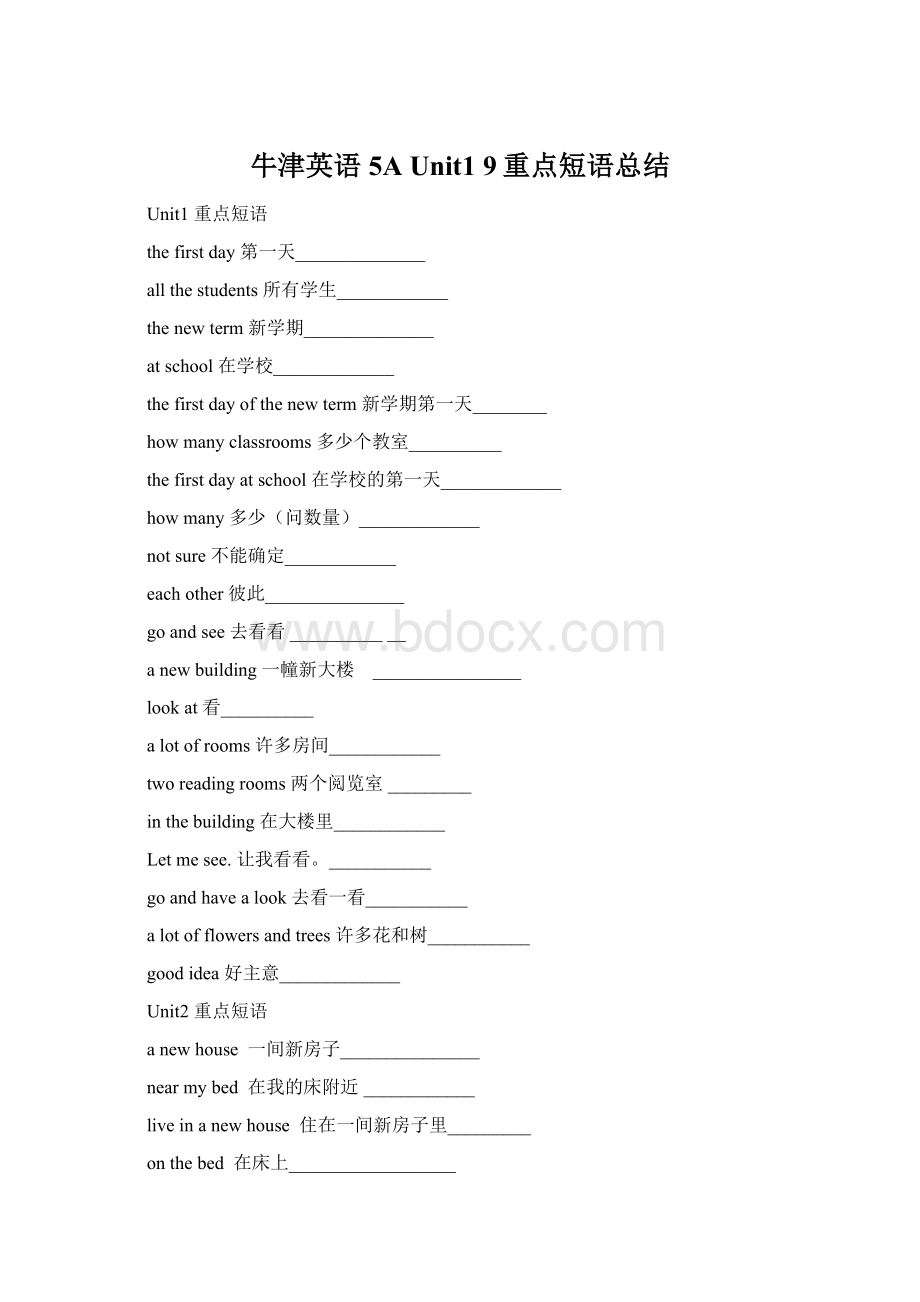牛津英语5AUnit1 9重点短语总结Word下载.docx
《牛津英语5AUnit1 9重点短语总结Word下载.docx》由会员分享,可在线阅读,更多相关《牛津英语5AUnit1 9重点短语总结Word下载.docx(8页珍藏版)》请在冰豆网上搜索。

anewhouse一间新房子_______________
nearmybed在我的床附近____________
liveinanewhouse住在一间新房子里_________
onthebed在床上__________________
nearherschool在她学校附近__________
onthewall在墙上_________________
threebedrooms三个卧室_______________underthechair在椅子下________________
alargestudy一个大书房_______________behindthedoor在门后__________________
inyourbedroom在你的卧室里____________
nearmydesk在我课桌附近______________
inthecat’smouth在猫的嘴里_______________
onmychair在我的椅子上____________
herparents她父母亲________________
verymuch非常____________________
somedolls一些娃娃_________________
amapoftheworld一张世界地图_____________
intheblackhat戴着黑色的帽子___________
Unit3重点短语
singasong唱一首歌_____________
makeaplane做一架飞机______________
rideabike骑自行车_______________
putabookonyourhead把一本书放在你头上___
twoo’clock两点整________________
haveanEnglishclass上一堂英语课________
learnthesong学歌________________
intheclassroom在教室里____________
listentothesong听歌______________
atamusiclesson在一节音乐课上_________
intheafternoon在下午______________
inthemusicroom在音乐教室里________
playtheviolin演奏小提琴____________
followme跟我(唱)_____________
haveanice-cream吃个冰淇淋_____________
Unit4重点短语
hisfamily他的一家_____________wouldliketo想要(做什么)________
needsomechocolate需要一些巧克力________
needsomeflowers需要一些花___________
howmuch多少钱_______________lookat看__________________
abusdriver一位公共汽车司机___________
likehorses喜欢马_______________
likeswimming喜欢游泳_____________
intheevenings在晚上(泛指)_________
withourfriends和我们的朋友_________
listentomusic听音乐____________
likereading喜欢看书_____________buythings买东西______________
thesezebras这些斑马___________
atigermask一个老虎面具_________
myparents我的父母亲___________watchTV看电视_____________
buysomemasks买一些面具__________apumpkinlantern一个南瓜灯________________
buyapumpkin买一个南瓜____________
agoodidea一个好主意___________
inthesitting–room在客厅里_____________
aHalloweenparty一个万圣节晚会_________________
onSaturdaysandSundays在星期六和星期天_______________
Unit6重点短语
help…with帮助(某人)…做(某事)_______
washclothes洗衣服__________
dohousework做家务__________
sweepthefloor扫地 ____________
comeandhelpme过来帮我 ___________
makeacake做一个蛋糕__________
helpme帮我 ____________
eatit吃它_________
Seeyou.再见。
___________
Seeyouthisafternoon.今天下午见。
__________
comeandhelpmewithmyMaths来教我数学__________
lookgood看起来不错_________
domyhomework做我的家庭作业__________________
thisafternoon今天下午_______________________
cleanthewindowsandthedoors擦窗和门 ___________________
howabout…怎么样_________________________
athome在家_______________________
Sundaymorning星期天早晨 _____________________
Unit7重点短语
runafter追赶________________________
afterschool放学后______________________
afterclass课后_______________________
lookfor寻找________________________
picturebook图画书,画册_____________________
playwithayo-yo玩溜溜球 __________________
playwith拿…玩;
和…一起玩 ______________
intheoffice在办公室里___________________-
intheplayground在操场上____________________
danceonthedog’shead在狗的头上跳舞_________________
situnderthebed坐在床下_____________________
gototheplayground去操场____________________
readanewspaper看报纸________________________
readapicturebook看画册_________________________
playchess下棋_________________________
jumponthebed跳到床上______________________
thefivetigersonthekite风筝上的五只老虎 ___________
playcards打牌_____________________
eatthedog’sfood吃狗的食物_________________
readamagazine看杂志 ____________________
sitonavolleyball坐在一个排球上________________
makeamodelship做一艘模型船 _______________
gotothelibrary去图书馆___________________
playbasketball打篮球__________________
cleanthelibrary打扫图书馆______________________
Unit8重点短语
theirteachers他们的老师们____________________
nearthehill在小山附近________________________
abigtent一个大帐篷______________________
sitbesidehertent坐在她的帐篷旁边__________________
atinofchicken一罐鸡肉 ________________________-
inthefridge在冰箱里____________________
aboxofchocolate一盒巧克力__________________
smalleyes小眼睛___________________________
overthere在那边_______________________
sometinsoffish一些鱼罐头_______________________
twoblankets两条毯子 _______________________
somefruit一些水果_______________________
alotoftoys许多玩具 ________________________
longhair长头发__________________________
bigears大耳朵_________________________
acampingtrip一个野营旅行__________________
atacampingsite在一个野营营地 __________________
Unit9重点短语
cometotheblackboard
到黑板上来
____________________
buyacardforme买一张贺卡给我_________________
anArtlesson一节美术课______________________
teachEnglish
教英语
______________________
playwithher和她一起玩___________________
makeakite
做一个风筝
onthepaper在纸上______________________
thegirlbehindme
在我后面的女孩
____________________
showmeyournewbag把你的新包给我看看_________________
howmanyrectangles
多少个长方形
fivestars五颗星_________________________
lookatthemoon
看月亮
___
__________________
teachusEnglish教我们英语____________________
drawahouse画一座房子
__________________
givemesomepaper给我一些纸____________________
whatshape
什么形状
_________________
makeacard制作一张卡片_________________
haveaChineselesson上一节语文课_____________________
Unit1----Unit4知识点
1.Therebe(is|are)句型的基本用法是:
(1)表示“某地存在有某人(或某物),而并非某地(某人、某物)拥有什么东西”,其形式为:
“Therebe+名词(短语)+地点”。
例如:
Thereisaslideintheschool.(单数)
Therearesomeslidesintheschool.(复数)
(2)否定句是在be后加not;
Thereisn’taslideintheschool.(单数)
Therearen’tanyslidesintheschool.(复数)
(3)一般疑问句是将be(is|are)放在句首其形式为:
“be+there”构成。
Isthereaslideintheschool.(单数)
Arethereanyslidesintheschool.(复数)
(4)therebe句型在使用时要遵循“就近原则”
(1)There____(amisare)apenandtwobooksonthedesk.
(2)There____(amisare)twobooksandapenonthedesk.
答案:
(1)is,
(2)are.
讲解:
(1)“be(amisare)”动词后的apen为单数形式,所以要用“is”,
(2)“be(amisare)”动词后的twobooks为复数形式,所以要用“are”.这就是我们讲的“就近原则”
2.some与any的用法:
some常用在肯定句中。
Therearesomebooksonthedesk.
any则常用在否定和疑问句中。
Therearen’tanybooksonthedesk.
Arethereanybooksonthedesk?
3.情态动词can的用法:
(can+动词原形)
情态动词can有一定的词义,但不能独立存在,它必须与动词的原形一起构成谓语。
情态动词没有人称和数的变化。
它有很多的用法,我们现在所学的其中一种表示“能,会”指脑力或体力方面的“能力”。
Icansing.我会唱歌
Jimcanswim,butIcan’t.吉姆会游泳,但我不会。
思考:
我们还学过那些词后面也要用动词原形:
__________________________________________________
4.like的用法;
like表示“喜欢”,我们在使用时要重点注意它的前前后后。
I.like前
like和其它行为动词一样,在肯定句中,主语是第一人称、第二人称以及第三人称复数时谓语动词一般现在时用原形,但第三人称单数时要加词尾-s,如:
Manypeoplelikescience.很多人喜欢科学。
Myteacherlikesreadingbooks.我的老师喜欢读书。
但变为疑问句和否定句时要注意:
(1)主语是第一人称(单数和复数)I、we、第二人称you以及第三人称复数they、LiPingandMary、thedesks等,变为疑问句和否定句时要借助助动词do,谓语动词不变。
如:
Ilikeplayingtabletennisverymuch.→Doyoulikeplayingtabletennisverymuch.
Theylikeplayingbasketball.→Theydon’tlikeplayingbasketball.
(2)主语是第三人称单数时,变为疑问句和否定句时要借助助动词does,谓语动词改为原形。
Marylikespizza.→Marydoesn’tlikepizza.
Helikesplayingthepiano.→Doeshelikeplayingthepiano?
II.like后
(1)like后跟可数名词表示类别时,名词通常用复数形式,不用单数形式。
Ilikemasks我喜欢面具。
Marylikesdumplings.玛丽喜欢饺子。
(2)like后跟不可数名词时,名词通常用原形。
如:
Mikedoesn’tlikepizza.迈克不喜欢比撒饼。
(3)like后跟动词,要用-ing形式。
Iliketakingphotos.我喜欢照相。
(4)like后跟动词,也可用todo形式。
Doyouliketoplaycomputergames?
你喜欢玩电脑游戏吗?
注意:
通常情况下用-ing形式和todo形式没有较大区别,可互相换用。
但有时用-ing形式表示习惯性动作,而用todo形式表示具体的一次动作。